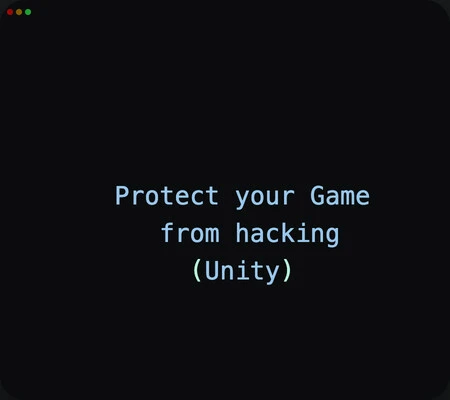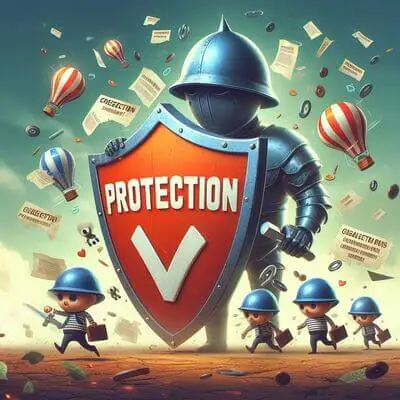Back To Home

Security
29-03-2024
From Noob to Ninja: Mastering Unity Game Security (Before Hackers Do!)
As game developers, ensuring the security of our Unity games is crucial to safeguard our hard work and protect the player experience. While no security measure is entirely foolproof. We can’t completely 100% make our game hack proof but we can make it very hard for cheaters to cheat the game.

There are several best practices and security tips we can implement to make our games more resistant to hacking attempts. In this article, we will explore effective ways to enhance the security of your Unity games and protect them from potential vulnerabilities.
1. Code Obfuscation:-
Imagine you have a secret code that you want to keep safe from others who might try to understand it. That’s where code obfuscation comes in. It’s like turning your secret code into a puzzle that’s really hard to solve.
Code obfuscation is a way to make the game’s code harder to understand. Normally, when people make games, they write lines of instructions called code to tell the game what to do. But if someone can easily read and understand that code, they might be able to do things you don’t want them to do, like cheat or copy your game.
So, code obfuscation is like taking that code and mixing it up so that it becomes really difficult to understand. It’s like turning it into a secret language that only the game and the computer can understand, but it’s really hard for people to figure out.
This way, even if someone tries to look at the code of your game, it will be so confusing and jumbled up that it’s like trying to solve a really tough puzzle. And the harder the puzzle, the less likely they’ll be able to understand it and mess with your game.
There are many unity packages available in unity asset store, you can try these packages and protect your game.
One of the free package available in Unity asset store is :
obfuscator-freeIf you are using Mono in your unity game then your code can be seen in plain text after extracting your game apk. So i suggest moving to IL2CPP.
Using IL2CPP (Intermediate Language to C++) in Unity can help increase the security of your code. When you write code for your game, it’s usually in a language called C#. However, when you build your game with IL2CPP, it translates the C# code into a lower-level language called C++. This conversion makes it much harder for hackers to read and understand your code in plain text.
C++ code is more complex and harder to decipher compared to C#. This adds an extra layer of protection to your game’s code, making it more difficult for hackers to reverse-engineer or manipulate your game.
While IL2CPP doesn’t make your code completely unhackable, it makes it significantly more challenging for someone to analyze and modify your code. It’s like encoding your instructions in a language that’s much harder to understand, making it more challenging for hackers to tamper with your game.
Note: Please plan it from the beginning of the development that you are going to obfuscate your code. So later it doesn’t break your running code.
2. Score:-
A lot of cheaters or beginners tries to hack the score of the game as they think it could be easy to hack, so they try different cheating tool like GameGuardian, cheat engine etc. So lets see how we can protect it.
Protecting the score of your game, whether locally or on a server, is crucial to maintain fair competition and prevent cheating. Here are some approaches to consider for protecting game scores:
Score Protection:
If your game stores scores locally on the player’s device, it’s important to implement measures to protect them. Here are a few techniques:
Score Consistency Checks :
Keep track of the score’s expected progression and validate it against the actual values received from the client. For example, you can calculate the expected score based on the game’s rules and check if the received score aligns with the expected progression. Unexpected jumps or discrepancies can indicate potential cheating.-
Encryption :
Encrypt the score data stored locally to make it. difficult for hackers to tamper with or modify the values directly. -
Obfuscation :
Obfuscate the score data in memory to make it harder for hackers to locate and modify the values during runtime. This can involve techniques like variable renaming or splitting the score into multiple components.
Server-side Score Protection:
For multiplayer or online games, storing scores on a server provides more control and security. Here are some strategies to protect scores on the server:
Server-side Validation :
Implement server-side score validation to ensure that submitted scores are legitimate and comply with predefined rules. Perform checks for unusual or impossible scores to detect and prevent hacking attempts.-
Secure Communication :
Establish secure communication channels between the game client and server to prevent tampering or interception of score data. Use encryption protocols like SSL/TLS to protect the transmission of scores. -
Server-side Score Calculation :
Calculate the final score on the server rather than relying solely on client-side calculations. This prevents manipulation of scores by modifying client-side code or exploiting vulnerabilities in the game client. -
Logs and Monitoring :
Implement comprehensive logging and monitoring on the server to detect any suspicious activity related to score submissions. Regularly review logs to identify anomalies and take appropriate action against cheaters.
3. Monitor Game Events and Actions :-
Monitor Game Events and Actions: Track the sequence of game events and actions leading to score changes. By logging and analyzing the gameplay patterns and actions taken by the player, you can detect abnormal or suspicious behavior that may indicate cheating. This can help identify instances where the score changes significantly or rapidly, suggesting unauthorized modifications.
4. Anti-cheat Toolkit :-

To protect your Unity game from cheating attempts locally, you can utilize an anti-cheat toolkit or framework available in unity.
Link : Anti-cheat-toolkit
The Anti-Cheat Toolkit is a popular Unity asset that provides a comprehensive set of anti-cheat features. It includes runtime memory scanning, integrity checks, and encryption for protecting game data. ACTk helps you detect and prevent cheating in your local Unity game effectively. I personally use it for my games. It works perfectly fine.
It protects variable in memory, playerprefs, can detect speed hack, wall hack, time hack etc.
NOTE: Before implementing any anti-cheat toolkit or framework, carefully evaluate their features, documentation, community support, and compatibility with your specific Unity version. Choose a solution that aligns with your game’s requirements and consider the level of support and updates provided by the toolkit’s developers.
Remember, while these anti-cheat tools can help deter cheating, determined hackers may still find ways to bypass security measures. Therefore, it’s important to regularly update and improve your anti-cheat implementation and stay vigilant against emerging cheating techniques.
Anti-Cheat Toolkit (ACTk):
5. Secure network communication :-
Secure network communication refers to the process of ensuring that data transmitted between different devices or systems is protected from unauthorized access or tampering. In simpler terms, it’s about making sure that information sent over a network is secure and can’t be easily intercepted or changed by hackers.
To achieve secure network communication, several measures are implemented:
Encryption :
It is a way of protecting information by turning it into secret code. It’s like putting a message inside a locked box that can only be opened with a special key. When data is encrypted, it becomes unreadable to anyone who doesn’t have the key. This ensures that even if someone manages to intercept the data, they won’t be able to understand it. Encryption helps keep our sensitive information, such as score, items, money etc safe from cheaters.Protocols :
Secure protocols, like SSL (Secure Sockets Layer) or TLS (Transport Layer Security), are used to establish a secure connection between devices. These protocols ensure that data transmitted between them is encrypted and protected from eavesdropping or tampering.Integrity :
This ensures that data remains unchanged during transmission. Techniques like checksums or hashing are used to verify that the data received is the same as the data sent, preventing unauthorized modifications.
By implementing secure network communication measures, you can protect your data from being intercepted, modified, or accessed by unauthorized parties. It’s like putting a lock on your information to keep it safe while it travels across networks.
6. Secure Asset Storage :-
It refers to the practice of protecting important game assets, such as graphics, sounds, or other files, from unauthorized access or theft. In simpler terms, it means keeping your game’s valuable resources safe and preventing others from stealing or tampering with them.
7. Third-Party Library :-
When using third-party libraries or plugins in your game, ensure they come from reputable sources and regularly check for updates. Vulnerabilities in third-party components can pose a risk to your game’s security.
In simpler terms, when you want to use code or functionality created by someone else in your game, you need to evaluate if it’s a good fit for your needs. Here’s how it can be done:
Research :
Conduct thorough research on the library or component you are considering. Look for information about its reputation, user reviews, and community support. Determine if it is widely used, actively maintained, and has a good track record.Security Considerations :
Assess the security aspects of the library. Check for any known vulnerabilities or security issues by reviewing security advisories or conducting a code audit. Ensure that the library follows best practices for data protection and handles potential security risks.Compatibility and Integration :
Evaluate how well the library integrates with your existing game code and development environment. Consider factors such as programming language compatibility, documentation quality, and ease of use.Support and Updates :
Assess the level of support provided by the library’s developers. Check if they offer timely updates, bug fixes, and responsive customer support. A library with an active community and ongoing development is generally more reliable and beneficial for your project.
By evaluating third-party libraries, you can make informed decisions about which ones to include in your game. This helps ensure that you choose reputable, secure, and compatible components that enhance your game’s functionality and minimize the risks associated with using external code.
I hope you found this blog post enjoyable!